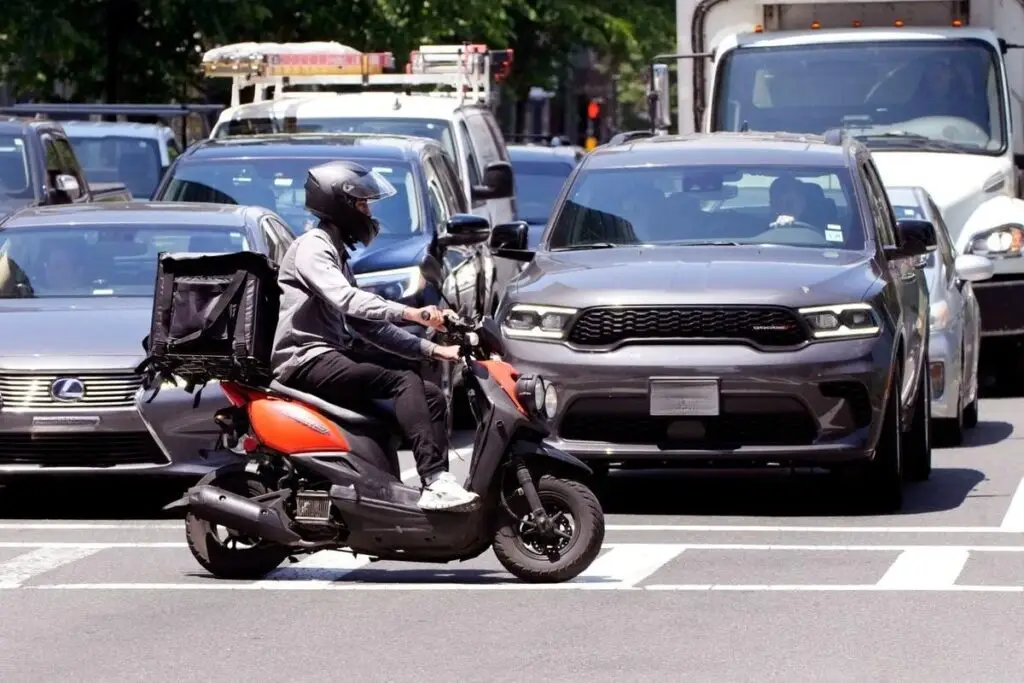In response to the surge in food delivery services, major cities are intensifying their efforts to curb dangerous driving practices among delivery drivers. This year alone, New York City authorities have seized 13,000 scooters and mopeds, with over 200 being destroyed just this past Wednesday.
The rapid increase in demand for food delivery has led to a significant rise in the number of scooters, motorcycles, and mopeds weaving through city traffic. This situation has triggered growing concern among officials in large cities like Boston, New York, and Washington, D.C. These cities have started to take action by sending warning letters, confiscating illegally operated vehicles, and deploying special street patrols to enforce traffic laws and speed limits. Similar measures are being observed in London and other British cities.
Delivery companies have committed to collaborating with city officials to ensure compliance with traffic regulations. In Boston, officials addressed the alarming rise in unlawful and hazardous operation of two-wheeled vehicles in a letter to major food delivery companies. The letter highlighted risks posed to drivers, motorists, and pedestrians alike. In response, Massachusetts State Police identified numerous unregistered mopeds and scooters, leading to the seizure of 14 illegal vehicles in one Boston neighbourhood.
New York City’s crackdown has been particularly severe, with authorities crushing over 200 illegal mopeds and other delivery vehicles. Meanwhile, Washington, D.C. has launched Operation Ride Right. This initiative aims to ensure that two-wheeled vehicle drivers follow the law, resulting in five arrests and impounding 17 mopeds since its inception. Mayor Eric Adams underscored the aggressive enforcement strategy, pointing out the threat these drivers pose, especially to elderly pedestrians.
The shift from cars to motorcycles and mopeds began during the COVID-19 pandemic, driven by increased traffic congestion. Delivery drivers, many of whom are immigrants, stress their need to earn a living while acknowledging the presence of unlicensed and reckless operators among them. Luis López, a delivery driver from the Dominican Republic, emphasised that most drivers are law-abiding but admitted that some engage in dangerous practices like running red lights.
Authorities are now looking beyond the drivers to the delivery companies themselves, urging them to ensure safe operations. This scrutiny is relatively new compared to the attention given to car-based gig workers in the past. Hilary Robinson, an academic at Northeastern University, noted that the push for low-wage, high-risk labour has highlighted the inherent dangers of such jobs. Meanwhile, delivery worker William Medina criticised companies for setting unrealistic delivery expectations that contribute to the problem.
In Boston, City Councillor Edward Flynn called for stricter adherence to traffic laws on social media. Residents have mixed feelings: while some support the crackdowns due to frequent traffic violations, others who rely on these services for convenience express concerns about the implications for their daily lives. Jaia Samuel, a Boston hospital worker, described the situation as unsafe yet acknowledged the essential service provided by delivery drivers. Delivery companies have stated their commitment to ensuring their drivers are responsible and law-abiding, though enforcement remains a pivotal issue.
The crackdown on dangerous driving by delivery drivers in major cities reflects a broader effort to balance public safety with the growing demand for food delivery services. With city authorities and delivery companies working together, the aim is to create a safer environment for all road users.

